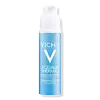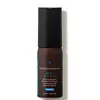What's inside
What's inside
 Key Ingredients
Key Ingredients

 Benefits
Benefits

 Concerns
Concerns

 Ingredients Side-by-side
Ingredients Side-by-side

Water
Skin ConditioningGlycerin
HumectantDimethicone
EmollientPropanediol
SolventDimethicone/PEG-10/15 Crosspolymer
CI 42090
Cosmetic ColorantCaffeine
Skin ConditioningSodium Chloride
MaskingSodium Citrate
BufferingSodium Hyaluronate
HumectantSodium Hydroxide
BufferingPhenoxyethanol
PreservativeP-Anisic Acid
MaskingChondrus Crispus
MaskingDisodium EDTA
Citric Acid
BufferingBiosaccharide Gum-1
HumectantPolymethylsilsesquioxane
Ceramide AP
Skin ConditioningWater, Glycerin, Dimethicone, Propanediol, Dimethicone/PEG-10/15 Crosspolymer, CI 42090, Caffeine, Sodium Chloride, Sodium Citrate, Sodium Hyaluronate, Sodium Hydroxide, Phenoxyethanol, P-Anisic Acid, Chondrus Crispus, Disodium EDTA, Citric Acid, Biosaccharide Gum-1, Polymethylsilsesquioxane, Ceramide AP
Water
Skin ConditioningDipropylene Glycol
HumectantButylene Glycol
HumectantUndecane
EmollientBis-Hydroxyethoxypropyl Dimethicone
EmollientAlcohol Denat.
AntimicrobialAscorbic Acid
AntioxidantDimethicone
EmollientCaprylic/Capric Triglyceride
MaskingTridecane
PerfumingPhloretin
AntioxidantLauryl PEG-9 Polydimethylsiloxyethyl Dimethicone
Skin ConditioningDimethicone/PEG-10/15 Crosspolymer
Dimethicone/Polyglycerin-3 Crosspolymer
CleansingFerulic Acid
AntimicrobialRuscus Aculeatus Root Extract
AstringentCaffeine
Skin ConditioningDisodium EDTA
Sodium Hydroxide
BufferingWater, Dipropylene Glycol, Butylene Glycol, Undecane, Bis-Hydroxyethoxypropyl Dimethicone, Alcohol Denat., Ascorbic Acid, Dimethicone, Caprylic/Capric Triglyceride, Tridecane, Phloretin, Lauryl PEG-9 Polydimethylsiloxyethyl Dimethicone, Dimethicone/PEG-10/15 Crosspolymer, Dimethicone/Polyglycerin-3 Crosspolymer, Ferulic Acid, Ruscus Aculeatus Root Extract, Caffeine, Disodium EDTA, Sodium Hydroxide
Alternatives
Ingredients Explained
These ingredients are found in both products.
Ingredients higher up in an ingredient list are typically present in a larger amount.
Caffeine is most associated with coffee, tea, and cacao. In skincare, it helps with calming inflammation and is rich in antioxidants.
While caffeine is used to treat cellulite and and dark circles, further studies are needed to prove this. It has been believed to help with these skin conditions due to its ability to dilate blood vessels and increase blood flow.
Some studies are looking into caffeine's ability to protect against UV rays.
Learn more about CaffeineDimethicone is a type of synthetic silicone created from natural materials such as quartz.
What it does:
Dimethicone comes in different viscosities:
Depending on the viscosity, dimethicone has different properties.
Ingredients lists don't always show which type is used, so we recommend reaching out to the brand if you have questions about the viscosity.
This ingredient is unlikely to cause irritation because it does not get absorbed into skin. However, people with silicone allergies should be careful about using this ingredient.
Note: Dimethicone may contribute to pilling. This is because it is not oil or water soluble, so pilling may occur when layered with products. When mixed with heavy oils in a formula, the outcome is also quite greasy.
Learn more about DimethiconeDimethicone/PEG-10/15 Crosspolymer is a type of silicone.
Disodium EDTA plays a role in making products more stable by aiding other preservatives.
It is a chelating agent, meaning it neutralizes metal ions that may be found in a product.
Disodium EDTA is a salt of edetic acid and is found to be safe in cosmetic ingredients.
Learn more about Disodium EDTASodium Hydroxide is also known as lye or caustic soda. It is used to adjust the pH of products; many ingredients require a specific pH to be effective.
In small amounts, sodium hydroxide is considered safe to use. However, large amounts may cause chemical burns due to its high alkaline.
Your skin has a natural pH and acid mantle. This acid mantle helps prevent harmful bacteria from breaking through. The acid mantle also helps keep your skin hydrated.
"Alkaline" refers to a high pH level. A low pH level would be considered acidic.
Learn more about Sodium HydroxideWater. It's the most common cosmetic ingredient of all. You'll usually see it at the top of ingredient lists, meaning that it makes up the largest part of the product.
So why is it so popular? Water most often acts as a solvent - this means that it helps dissolve other ingredients into the formulation.
You'll also recognize water as that liquid we all need to stay alive. If you see this, drink a glass of water. Stay hydrated!
Learn more about Water